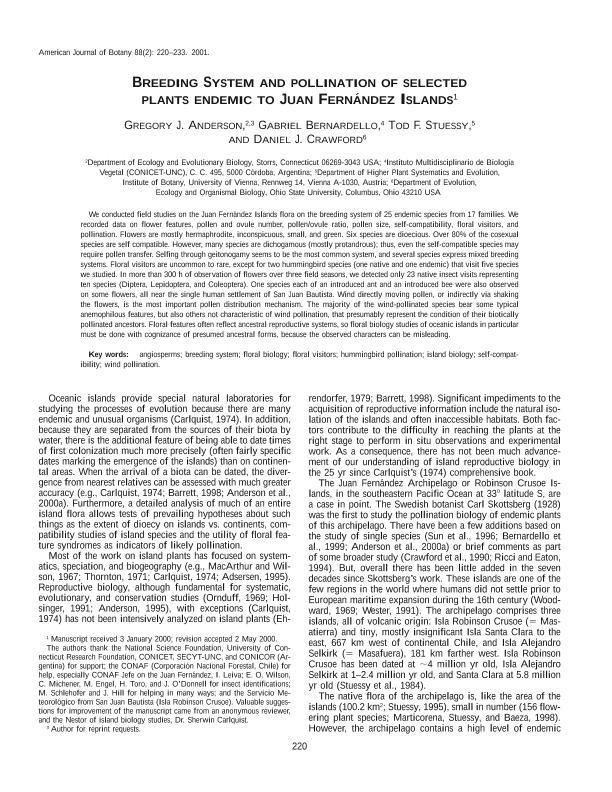Artículo
Breeding system and pollination of selected plants endemic to Juan Fernandez Islands
Fecha de publicación:
02/2001
Editorial:
Botanical Society of America
Revista:
American Journal of Botany
ISSN:
0002-9122
e-ISSN:
1537-2197
Idioma:
Inglés
Tipo de recurso:
Artículo publicado
Clasificación temática:
Resumen
We conducted field studies on the Juan Fernández Islands flora on the breeding system of 25 endemic species from 17 families. We recorded data on flower features, pollen and ovule number, pollen/ovule ratio, pollen size, self-compatibility, floral visitors, and pollination. Flowers are mostly hermaphrodite, inconspicuous, small, and green. Six species are dioecious. Over 80% of the cosexual species are self compatible. However, many species are dichogamous (mostly protandrous); thus, even the self-compatible species may require pollen transfer. Selfing through geitonogamy seems to be the most common system, and several species express mixed breeding systems. Floral visitors are uncommon to rare, except for two hummingbird species (one native and one endemic) that visit five species we studied. In more than 300 h of observation of flowers over three field seasons, we detected only 23 native insect visits representing ten species (Diptera, Lepidoptera, and Coleoptera). One species each of an introduced ant and an introduced bee were also observed on some flowers, all near the single human settlement of San Juan Bautista. Wind directly moving pollen, or indirectly via shaking the flowers, is the most important pollen distribution mechanism. The majority of the wind-pollinated species bear some typical anemophilous features, but also others not characteristic of wind pollination, that presumably represent the condition of their biotically pollinated ancestors. Floral features often reflect ancestral reproductive systems, so floral biology studies of oceanic islands in particular must be done with cognizance of presumed ancestral forms, because the observed characters can be misleading.
Palabras clave:
Angiosperms
,
Breeding System
,
Floral Biology
,
Floral Visitors
Archivos asociados
Licencia
Identificadores
Colecciones
Articulos(IMBIV)
Articulos de INST.MULTIDISCIPL.DE BIOLOGIA VEGETAL (P)
Articulos de INST.MULTIDISCIPL.DE BIOLOGIA VEGETAL (P)
Citación
Anderson, Gregory J.; Bernardello, Gabriel Luis Mario; Stuessy, Tod F.; Crawford, Daniel J.; Breeding system and pollination of selected plants endemic to Juan Fernandez Islands; Botanical Society of America; American Journal of Botany; 88; 2; 2-2001; 220-223
Compartir
Altmétricas




